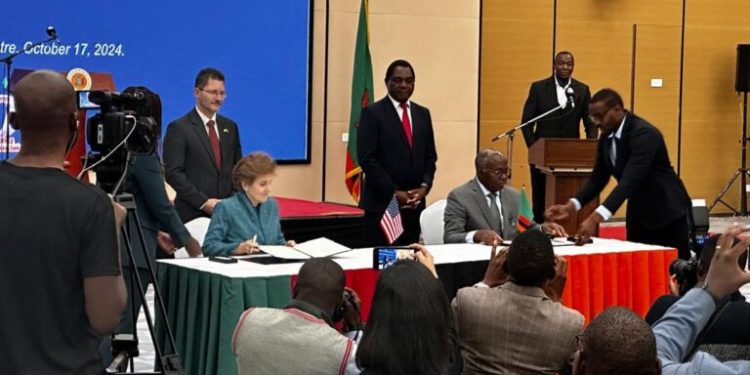Zambia and the United States (US) have signed a $491mn Zambia Farm-to-Market Compact to boost economic growth in the latter, in what is the latest in a series of deals aimed at tormenting relations with Central and Southern African countries.
- The deal, which was signed in Lusaka on October 17th, includes $458mn from the US and $33mn from Zambia.
- The deal has four projects: a roads and access component, an asset finance component, an agriculture policy reform component, and a development project to facilitate US Development Finance Corporation (DFC) investments in the country.
- It was signed in the lead up to Zambia’s 60th Independence Day celebrations on October 24th, and just weeks after outgoing US President Joe Biden cancelled a trip to the neighbouring Angola.
“This compact makes it easier for Zambia’s farmers and agriculture processors to sell their products and grow their businesses, an output critical to Zambia’s economic growth,” US Millennium Challenge Corporation (MCC) Chief Executive Officer (CEO) Alice Albright said during the signing.
Zambia is currently one of the countries at the epicentre of US-China competition for the region’s raw materials, which are crucial for battery technology. It is part of the Lobito Corridor, in which the US has already pledged $4mn after hosting the signing of the deal in September. The deal will see the Africa Finance Corporation connect railway lines in Angola and Zambia, connecting to the Cape to Cairo Railway, and most importantly, connecting Tenke in the Democratic Republic of Congo (DRC) to the Atlantic Ocean.
“The signing of the second Millennium Challenge Compact today signifies yet another landmark in our bilateral cooperation and friendly relations with the people and government of the United States of America,” President Hichilema said.
Just days after US President Joe Biden cancelled a trip to Luanda, Angola, the two countries have announced the signing of an open skies agreement. The agreement includes unrestricted capacity and frequency of services for both passenger and all-cargo carriers, open route rights, an open charter regime, self-handling provisions, and open code-sharing opportunities.




